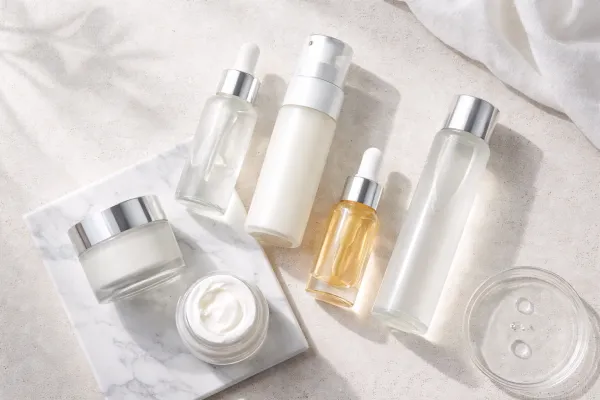Does Skin Get Used to Products? Understanding Your Skin's Adaptation Mechanisms
Explore how skin adapts to products, signs of adaptation, and tips for adjusting your skincare routine.

Taking care of our skin can sometimes feel confusing, especially when we notice changes in how products work.
Many wonder if their skin gets used to certain skincare items, leading to less effectiveness. Understanding how our skin adapts and what signs to look for can help us maintain a glowing complexion.
This article will explore the reasons behind skin adaptation, how to recognize it, and tips for adjusting your routine to keep your skin healthy.
Key Takeaways
- Your skin can adapt to products, but it doesn't become immune to them.
- Signs of adaptation include reduced effectiveness and new skin issues.
- Factors like age, hormones, and the environment can affect how your skin reacts.
- Regularly adjusting your skincare routine can help maintain its effectiveness.
- Consistency in your routine is crucial for long-term skin health.
Why Does Skin Get Used to Products?

Understanding Skin Adaptation
We all know that our skin is a living organ, and just like us, it can adapt to changes.
When we start using a new product, our skin often responds positively at first.
This initial boost can be exciting!
But over time, our skin might not react the same way. This is because it gets used to the ingredients, leading to a plateau in results. It’s like when we eat the same food every day; eventually, it just doesn’t taste as good anymore!
Common Misconceptions
There’s a lot of confusion out there about whether our skin can actually become immune to products. Some folks think that if a product worked well at first, it must have stopped working altogether.
But that’s not quite right!
Our skin doesn’t build up an immunity to skincare products. Instead, it simply adjusts to them. So, if we notice a drop in effectiveness, it might be time to switch things up a bit.
Scientific Insights
Research shows that our skin is constantly changing due to factors like age, hormones, and even the environment.
For instance, as we age, our skin’s needs evolve. This means that what worked for us a year ago might not be as effective today.
Here’s a quick look at some factors that can influence how our skin adapts:
Factor | Impact on Skin Adaptation |
|---|---|
Age | Changes in elasticity and moisture levels |
Hormonal Changes | Fluctuations can lead to breakouts or dryness |
Environmental Factors | Pollution and UV exposure can alter skin health |
Remember, our skin is unique and deserves special care. Let’s listen to it and adjust our routine as needed!
How to Recognize When Your Skin Has Adapted

Signs to Look For
When our skin gets used to products, it can be tricky to spot. Here are some signs that might indicate adaptation:
- Less noticeable results: If we used to see improvements but now they seem to have plateaued, it might be time to reassess.
- Increased sensitivity: If our skin starts reacting negatively, like showing redness or irritation, it could be a sign.
- Changes in texture: If our skin feels rough or bumpy, it might be telling us something.
Differentiating Between Adaptation and Other Issues
Sometimes, it’s hard to tell if our skin has adapted or if there’s another problem. Here’s how we can differentiate:
- Check for new products: If we’ve recently introduced something new, it might be causing issues.
- Look for environmental changes: Changes in weather or stress levels can also affect our skin.
- Monitor for persistent issues: If problems like brown spots or discomfort persist, it’s worth consulting a dermatologist.
When to Consult a Dermatologist
If we notice any of the following, it might be time to reach out for professional help:
- Persistent irritation: If our skin feels uncomfortable for more than a few days.
- New spots or changes: If we see new spots appearing frequently, it’s best to get them checked.
- Lack of improvement: If our usual products aren’t working anymore, it’s a good idea to seek advice.
Remember, our skin deserves the best care. Always listen to it and adjust our routine as needed!
Factors That Influence Skin Adaptation
When it comes to our skin, it’s not just about the products we use; there are several factors that can really affect how our skin adapts. Let’s dive into some of these!
Age and Hormonal Changes
As we age, our skin goes through a lot of changes.
Hormonal shifts can impact everything from oil production to moisture levels. For instance, during puberty, our skin might get oilier, while menopause can lead to dryness. Here’s a quick look at how age affects our skin:
Age Group | Common Changes |
|---|---|
Teenagers | Oily skin, acne |
20s | Youthful glow, some dryness |
30s-40s | Fine lines, uneven texture |
50s and beyond | Thinner skin, increased dryness |
Environmental Factors
Our environment plays a huge role in how our skin reacts to products. Things like pollution, humidity, and even the weather can change how our skin feels and looks. Here are some environmental factors to consider:
- Pollution: Can lead to irritation and breakouts.
- Humidity: High humidity can make our skin feel oily, while low humidity can cause dryness.
- Sun Exposure: UV rays can damage our skin and affect how it responds to products.
Product Ingredients
Not all ingredients are created equal! Some can be super beneficial, while others might cause irritation. Here’s what to keep in mind:
- Active Ingredients: Ingredients like retinol can be great for anti-aging but may cause sensitivity.
- Fragrances: Often found in products, they can irritate sensitive skin.
- Preservatives: Some can cause reactions, so it’s good to know what’s in our products.
Remember, our skin is unique, and what works for one person might not work for another. Let’s pay attention to how our skin reacts and adjust our routines accordingly!
Adjusting Your Skincare Routine
When it comes to our skin, change is a good thing!
Just like our lives, our skin can change too, and that means our skincare routine might need a little tweaking. Here’s how we can make those adjustments smoothly:
When and How to Make Changes
- Listen to Your Skin: If it feels dry, oily, or irritated, it might be time to switch things up.
- Seasonal Adjustments: Our skin needs different care in summer versus winter. For example, we might want to use richer creams in winter to combat dryness.
- Monitor Product Performance: If a product that once worked well isn’t giving us the same results, it’s time to consider a change.
Choosing the Right Products
- Know Your Skin Type: Understanding whether we have oily, dry, or combination skin helps us pick the right products.
- Ingredient Awareness: Look for ingredients that suit our skin needs. For instance, hyaluronic acid is great for hydration.
- Avoid Overloading: Too many products can overwhelm our skin. Stick to essentials that work for us.
Seasonal Adjustments
Season | Recommended Products |
|---|---|
Winter | Rich creams, hydrating serums |
Summer | Lightweight gels, mattifying products |
Spring | Exfoliants, lighter moisturizers |
Autumn | Balancing products for mixed needs |
Remember, our skin is unique, just like us! By adjusting our routine, we can keep it healthy and glowing all year long. Let’s embrace these changes together!
The Role of Consistency in Skincare
When it comes to taking care of our skin, consistency is key.
We all want that youthful glow, right?
Well, sticking to a regular skincare routine can help us achieve just that. Here’s why it matters:
Building a Routine
- Habit Formation: Just like brushing our teeth, a daily skincare routine becomes second nature over time.
- Better Results: Our skin needs time to adjust and respond to products. Skipping days can slow down progress.
- Prevention: Regular care helps us avoid problems like dryness or breakouts.
Long-Term Benefits
Benefit | Description |
|---|---|
Improved Texture | Regular use of exfoliants and serums can lead to smoother skin over time. |
Enhanced Glow | A steady skincare regimen not only preserves your skin's natural health but also addresses specific concerns, leading to a clearer, more radiant complexion. |
Healthy Habits | Following a routine helps improve the look of post-acne marks and keeps our skin healthy. |
Remember, our skin deserves the best care. Always listen to it and adjust our routine as needed!
Expert Opinions on Skin Adaptation

Dermatologists' Insights
When we chat with dermatologists, they often emphasize that our skin is always changing.
It reacts to everything from the products we use to the environment around us. They remind us that our skin can adapt to products over time, which means what worked for us last year might not be as effective now.
Real-World Examples
We’ve all heard stories about friends who swear by a certain cream, only to find it stops working after a few months. This is a classic case of skin adaptation!
Here are some common scenarios:
- Moisturizers: What felt hydrating last summer might feel heavy this winter.
- Sunscreens: A product that worked well in spring may not cut it during the hot summer months.
- Cleansers: A gentle cleanser might be perfect for winter but too mild for summer sweat.
Myths Debunked
There are plenty of myths floating around about skin adaptation. Let’s clear a few up:
- Myth: Switching products frequently is better.
Truth: Our skin needs time to adjust to new products. - Myth: All skin types adapt the same way.
Truth: Everyone’s skin is unique, and reactions can vary. - Myth: If a product stops working, it’s bad.
Truth: It might just mean our skin has adapted!
Remember, understanding our skin's needs is a journey. Let’s keep learning and adapting together!
Lifestyle Tips for Healthy Skin

Managing Stress for Better Skin
We all know that stress can mess with our skin. Taking time to relax is key!
Here are some ways we can manage stress:
- Meditation: Just a few minutes a day can help clear our minds.
- Deep Breathing: Simple but effective; it calms our nerves.
- Hobbies: Engaging in activities we love can be a great escape.
The Role of Diet in Skin Health
What we eat really matters!
Foods rich in vitamins and minerals can help our skin glow. Here’s a quick list of skin-friendly foods:
- Nuts and Seeds: Great for collagen production, thanks to copper.
- Legumes: Packed with lysine, which is essential for skin repair.
- Fruits and Veggies: They provide antioxidants that fight skin damage.
Exercise and Skin Benefits
Staying active is not just good for our bodies; it’s great for our skin too! Here’s how:
- Increased Blood Flow: Helps deliver nutrients to our skin.
- Sweating: Cleans out our pores and removes toxins.
- Boosts Mood: A happy mind leads to happy skin!
Remember, taking care of our skin is a journey, not a race. Let’s enjoy the process together!
Wrapping It Up: Your Skin's Journey
Your skin is always changing, and that means your skincare routine should change too.
It’s like your skin is telling you what it needs, and it’s up to us to listen. Whether it’s switching up products or adjusting how we care for it, staying in tune with our skin is super important.
Remember, it’s not about using a million products; it’s about finding what works best for you.
So, keep experimenting, stay patient, and enjoy the journey to healthy, glowing skin!




